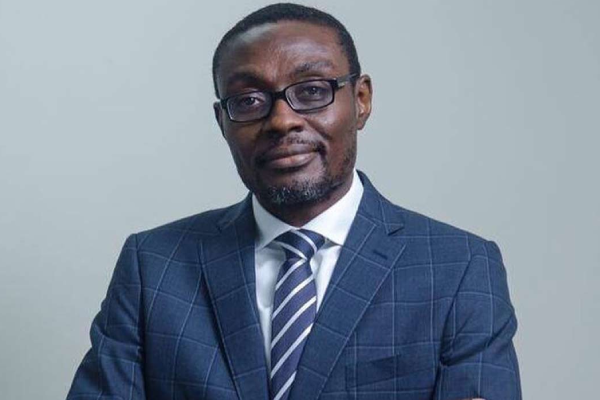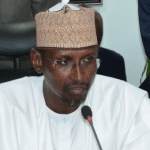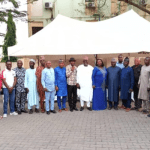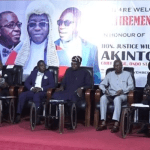The Lagos State Commissioner for Transportation, Frederic Oladeinde, has said that the state banned motorcycle operators popularly known as ‘Okada’ because they are not part of the ‘master plan of Lagos’.
He made the declaration on TVC Breakfast with Mike Okwoche, Veronica Dan-Ikpoyi and Kemi Fola-Adeyemo on Friday.
The commissioner stated that for Lagos to be a smart city, an integrated system of road, water, and rail would be required.
Okada, according to Dr. Oladehinde, worked in areas where rural people were migrating to urban areas.
“The whole of Lagos is urban and that is why Okada cannot survive in Lagos state”.
“There are over 50,000 Okada in Lagos, and the security reports we were receiving were very concerning, so it is critical that we protect lives and property in the state.”
[wonderplugin_video iframe=”https://youtu.be/1SCT-UBp7-w” lightbox=0 lightboxsize=1 lightboxwidth=960 lightboxheight=540 autoopen=0 autoopendelay=0 autoclose=0 lightboxtitle=”” lightboxgroup=”” lightboxshownavigation=0 showimage=”” lightboxoptions=”” videowidth=600 videoheight=400 keepaspectratio=1 autoplay=0 loop=0 videocss=”position:relative;display:block;background-color:#000;overflow:hidden;max-width:100%;margin:0 auto;” playbutton=”https://www.tvcnews.tv/wp-content/plugins/wonderplugin-video-embed/engine/playvideo-64-64-0.png”]
Speaking further on the enforcement of the Okada ban, the transport commissioner stated that banning Okada became necessary to avoid an influx of people from other countries coming into the state to continue the business.
“Okada was banned in Zamfara state and other areas, but people are still flocking to Lagos to run Okada businesses; there must be a push factor that prevents people from coming to Lagos.”
He noted that Lagos is not a dumping ground for Okada or a place where the whole west Africa can be fed.
“We have people from all over, chad, Niger, sudan etc. we must protect our people.
“As long as people continue to come into Lagos, there will always be gaps in the transportation infrastructure,” Dr. Oladehinde said.
Speaking of non-motorable areas, the commissioner for transportation stated that Lagos, as a smart city, currently has a number of ongoing projects to make infrastructure more accessible.
“We have a lot of projects going on in the state right now; PWC is fixing the roads to make them more accessible, rails and waterways are being developed, and more buses are being put on the road and integrated to make it seamless for people to use.”
“Obviously, we will continue to optimise our road network for more usage and that’s the future of Lagos State.”
Oladeinde explained that the state was considering space as well as security as part of its reason to stop the two-wheel and three-wheel modes of transport.
He said, “We are conscious of the environment and we are also security conscious. We want to move our people securely from one point to another.
The Commissioner also stated that the state government has put in place wealth creation programs and technical skills that people can learn to become self-sufficient, as opposed to continuous Okada riding, which he believes is not a sustainable profession and is not something the state government wants to encourage.
He advised those currently affected by the Okada ban to start a sustainable skill that would help them in the long run.
Dr Oladehinde explained that the Lagos transportation master plan is designed to give people options.
The master plan includes seven railway lines, fourteen BRTs, three of which have been developed, over twenty-six water routes, major rail roads, and roads connecting communities.
“We are attempting to make life easier for the people of Lagos by making it a liveable city, a smart and world-class city, and, most importantly, a dumping ground for people with nothing to do.”
“The future for transport is great. There has been a lot of pressure on the road and enforcement has been a challenge.”
The Lagos State Commissioner for Transportation, Frederic Oladeinde, has said that the state banned motorcycle operators popularly known as ‘Okada’ because they are not part of the ‘master plan of Lagos’.
He made the declaration on TVC Breakfast with Mike Okwoche, Veronica Dan-Ikpoyi and Kemi Fola-Adeyemo on Friday.
The commissioner stated that for Lagos to be a smart city, an integrated system of road, water, and rail would be required.
Okada, according to Dr. Oladehinde, worked in areas where rural people were migrating to urban areas.
“The whole of Lagos is urban and that is why Okada cannot survive in Lagos state”.
“There are over 50,000 Okada in Lagos, and the security reports we were receiving were very concerning, so it is critical that we protect lives and property in the state.”
[wonderplugin_video iframe=”https://youtu.be/1SCT-UBp7-w” lightbox=0 lightboxsize=1 lightboxwidth=960 lightboxheight=540 autoopen=0 autoopendelay=0 autoclose=0 lightboxtitle=”” lightboxgroup=”” lightboxshownavigation=0 showimage=”” lightboxoptions=”” videowidth=600 videoheight=400 keepaspectratio=1 autoplay=0 loop=0 videocss=”position:relative;display:block;background-color:#000;overflow:hidden;max-width:100%;margin:0 auto;” playbutton=”https://www.tvcnews.tv/wp-content/plugins/wonderplugin-video-embed/engine/playvideo-64-64-0.png”]
Speaking further on the enforcement of the Okada ban, the transport commissioner stated that banning Okada became necessary to avoid an influx of people from other countries coming into the state to continue the business.
“Okada was banned in Zamfara state and other areas, but people are still flocking to Lagos to run Okada businesses; there must be a push factor that prevents people from coming to Lagos.”
He noted that Lagos is not a dumping ground for Okada or a place where the whole west Africa can be fed.
“We have people from all over, chad, Niger, sudan etc. we must protect our people.
“As long as people continue to come into Lagos, there will always be gaps in the transportation infrastructure,” Dr. Oladehinde said.
Speaking of non-motorable areas, the commissioner for transportation stated that Lagos, as a smart city, currently has a number of ongoing projects to make infrastructure more accessible.
“We have a lot of projects going on in the state right now; PWC is fixing the roads to make them more accessible, rails and waterways are being developed, and more buses are being put on the road and integrated to make it seamless for people to use.”
“Obviously, we will continue to optimise our road network for more usage and that’s the future of Lagos State.”
Oladeinde explained that the state was considering space as well as security as part of its reason to stop the two-wheel and three-wheel modes of transport.
He said, “We are conscious of the environment and we are also security conscious. We want to move our people securely from one point to another.
The Commissioner also stated that the state government has put in place wealth creation programs and technical skills that people can learn to become self-sufficient, as opposed to continuous Okada riding, which he believes is not a sustainable profession and is not something the state government wants to encourage.
He advised those currently affected by the Okada ban to start a sustainable skill that would help them in the long run.
Dr Oladehinde explained that the Lagos transportation master plan is designed to give people options.
The master plan includes seven railway lines, fourteen BRTs, three of which have been developed, over twenty-six water routes, major rail roads, and roads connecting communities.
“We are attempting to make life easier for the people of Lagos by making it a liveable city, a smart and world-class city, and, most importantly, a dumping ground for people with nothing to do.”
“The future for transport is great. There has been a lot of pressure on the road and enforcement has been a challenge.”
The Lagos State Commissioner for Transportation, Frederic Oladeinde, has said that the state banned motorcycle operators popularly known as ‘Okada’ because they are not part of the ‘master plan of Lagos’.
He made the declaration on TVC Breakfast with Mike Okwoche, Veronica Dan-Ikpoyi and Kemi Fola-Adeyemo on Friday.
The commissioner stated that for Lagos to be a smart city, an integrated system of road, water, and rail would be required.
Okada, according to Dr. Oladehinde, worked in areas where rural people were migrating to urban areas.
“The whole of Lagos is urban and that is why Okada cannot survive in Lagos state”.
“There are over 50,000 Okada in Lagos, and the security reports we were receiving were very concerning, so it is critical that we protect lives and property in the state.”
[wonderplugin_video iframe=”https://youtu.be/1SCT-UBp7-w” lightbox=0 lightboxsize=1 lightboxwidth=960 lightboxheight=540 autoopen=0 autoopendelay=0 autoclose=0 lightboxtitle=”” lightboxgroup=”” lightboxshownavigation=0 showimage=”” lightboxoptions=”” videowidth=600 videoheight=400 keepaspectratio=1 autoplay=0 loop=0 videocss=”position:relative;display:block;background-color:#000;overflow:hidden;max-width:100%;margin:0 auto;” playbutton=”https://www.tvcnews.tv/wp-content/plugins/wonderplugin-video-embed/engine/playvideo-64-64-0.png”]
Speaking further on the enforcement of the Okada ban, the transport commissioner stated that banning Okada became necessary to avoid an influx of people from other countries coming into the state to continue the business.
“Okada was banned in Zamfara state and other areas, but people are still flocking to Lagos to run Okada businesses; there must be a push factor that prevents people from coming to Lagos.”
He noted that Lagos is not a dumping ground for Okada or a place where the whole west Africa can be fed.
“We have people from all over, chad, Niger, sudan etc. we must protect our people.
“As long as people continue to come into Lagos, there will always be gaps in the transportation infrastructure,” Dr. Oladehinde said.
Speaking of non-motorable areas, the commissioner for transportation stated that Lagos, as a smart city, currently has a number of ongoing projects to make infrastructure more accessible.
“We have a lot of projects going on in the state right now; PWC is fixing the roads to make them more accessible, rails and waterways are being developed, and more buses are being put on the road and integrated to make it seamless for people to use.”
“Obviously, we will continue to optimise our road network for more usage and that’s the future of Lagos State.”
Oladeinde explained that the state was considering space as well as security as part of its reason to stop the two-wheel and three-wheel modes of transport.
He said, “We are conscious of the environment and we are also security conscious. We want to move our people securely from one point to another.
The Commissioner also stated that the state government has put in place wealth creation programs and technical skills that people can learn to become self-sufficient, as opposed to continuous Okada riding, which he believes is not a sustainable profession and is not something the state government wants to encourage.
He advised those currently affected by the Okada ban to start a sustainable skill that would help them in the long run.
Dr Oladehinde explained that the Lagos transportation master plan is designed to give people options.
The master plan includes seven railway lines, fourteen BRTs, three of which have been developed, over twenty-six water routes, major rail roads, and roads connecting communities.
“We are attempting to make life easier for the people of Lagos by making it a liveable city, a smart and world-class city, and, most importantly, a dumping ground for people with nothing to do.”
“The future for transport is great. There has been a lot of pressure on the road and enforcement has been a challenge.”
The Lagos State Commissioner for Transportation, Frederic Oladeinde, has said that the state banned motorcycle operators popularly known as ‘Okada’ because they are not part of the ‘master plan of Lagos’.
He made the declaration on TVC Breakfast with Mike Okwoche, Veronica Dan-Ikpoyi and Kemi Fola-Adeyemo on Friday.
The commissioner stated that for Lagos to be a smart city, an integrated system of road, water, and rail would be required.
Okada, according to Dr. Oladehinde, worked in areas where rural people were migrating to urban areas.
“The whole of Lagos is urban and that is why Okada cannot survive in Lagos state”.
“There are over 50,000 Okada in Lagos, and the security reports we were receiving were very concerning, so it is critical that we protect lives and property in the state.”
[wonderplugin_video iframe=”https://youtu.be/1SCT-UBp7-w” lightbox=0 lightboxsize=1 lightboxwidth=960 lightboxheight=540 autoopen=0 autoopendelay=0 autoclose=0 lightboxtitle=”” lightboxgroup=”” lightboxshownavigation=0 showimage=”” lightboxoptions=”” videowidth=600 videoheight=400 keepaspectratio=1 autoplay=0 loop=0 videocss=”position:relative;display:block;background-color:#000;overflow:hidden;max-width:100%;margin:0 auto;” playbutton=”https://www.tvcnews.tv/wp-content/plugins/wonderplugin-video-embed/engine/playvideo-64-64-0.png”]
Speaking further on the enforcement of the Okada ban, the transport commissioner stated that banning Okada became necessary to avoid an influx of people from other countries coming into the state to continue the business.
“Okada was banned in Zamfara state and other areas, but people are still flocking to Lagos to run Okada businesses; there must be a push factor that prevents people from coming to Lagos.”
He noted that Lagos is not a dumping ground for Okada or a place where the whole west Africa can be fed.
“We have people from all over, chad, Niger, sudan etc. we must protect our people.
“As long as people continue to come into Lagos, there will always be gaps in the transportation infrastructure,” Dr. Oladehinde said.
Speaking of non-motorable areas, the commissioner for transportation stated that Lagos, as a smart city, currently has a number of ongoing projects to make infrastructure more accessible.
“We have a lot of projects going on in the state right now; PWC is fixing the roads to make them more accessible, rails and waterways are being developed, and more buses are being put on the road and integrated to make it seamless for people to use.”
“Obviously, we will continue to optimise our road network for more usage and that’s the future of Lagos State.”
Oladeinde explained that the state was considering space as well as security as part of its reason to stop the two-wheel and three-wheel modes of transport.
He said, “We are conscious of the environment and we are also security conscious. We want to move our people securely from one point to another.
The Commissioner also stated that the state government has put in place wealth creation programs and technical skills that people can learn to become self-sufficient, as opposed to continuous Okada riding, which he believes is not a sustainable profession and is not something the state government wants to encourage.
He advised those currently affected by the Okada ban to start a sustainable skill that would help them in the long run.
Dr Oladehinde explained that the Lagos transportation master plan is designed to give people options.
The master plan includes seven railway lines, fourteen BRTs, three of which have been developed, over twenty-six water routes, major rail roads, and roads connecting communities.
“We are attempting to make life easier for the people of Lagos by making it a liveable city, a smart and world-class city, and, most importantly, a dumping ground for people with nothing to do.”
“The future for transport is great. There has been a lot of pressure on the road and enforcement has been a challenge.”
The Lagos State Commissioner for Transportation, Frederic Oladeinde, has said that the state banned motorcycle operators popularly known as ‘Okada’ because they are not part of the ‘master plan of Lagos’.
He made the declaration on TVC Breakfast with Mike Okwoche, Veronica Dan-Ikpoyi and Kemi Fola-Adeyemo on Friday.
The commissioner stated that for Lagos to be a smart city, an integrated system of road, water, and rail would be required.
Okada, according to Dr. Oladehinde, worked in areas where rural people were migrating to urban areas.
“The whole of Lagos is urban and that is why Okada cannot survive in Lagos state”.
“There are over 50,000 Okada in Lagos, and the security reports we were receiving were very concerning, so it is critical that we protect lives and property in the state.”
[wonderplugin_video iframe=”https://youtu.be/1SCT-UBp7-w” lightbox=0 lightboxsize=1 lightboxwidth=960 lightboxheight=540 autoopen=0 autoopendelay=0 autoclose=0 lightboxtitle=”” lightboxgroup=”” lightboxshownavigation=0 showimage=”” lightboxoptions=”” videowidth=600 videoheight=400 keepaspectratio=1 autoplay=0 loop=0 videocss=”position:relative;display:block;background-color:#000;overflow:hidden;max-width:100%;margin:0 auto;” playbutton=”https://www.tvcnews.tv/wp-content/plugins/wonderplugin-video-embed/engine/playvideo-64-64-0.png”]
Speaking further on the enforcement of the Okada ban, the transport commissioner stated that banning Okada became necessary to avoid an influx of people from other countries coming into the state to continue the business.
“Okada was banned in Zamfara state and other areas, but people are still flocking to Lagos to run Okada businesses; there must be a push factor that prevents people from coming to Lagos.”
He noted that Lagos is not a dumping ground for Okada or a place where the whole west Africa can be fed.
“We have people from all over, chad, Niger, sudan etc. we must protect our people.
“As long as people continue to come into Lagos, there will always be gaps in the transportation infrastructure,” Dr. Oladehinde said.
Speaking of non-motorable areas, the commissioner for transportation stated that Lagos, as a smart city, currently has a number of ongoing projects to make infrastructure more accessible.
“We have a lot of projects going on in the state right now; PWC is fixing the roads to make them more accessible, rails and waterways are being developed, and more buses are being put on the road and integrated to make it seamless for people to use.”
“Obviously, we will continue to optimise our road network for more usage and that’s the future of Lagos State.”
Oladeinde explained that the state was considering space as well as security as part of its reason to stop the two-wheel and three-wheel modes of transport.
He said, “We are conscious of the environment and we are also security conscious. We want to move our people securely from one point to another.
The Commissioner also stated that the state government has put in place wealth creation programs and technical skills that people can learn to become self-sufficient, as opposed to continuous Okada riding, which he believes is not a sustainable profession and is not something the state government wants to encourage.
He advised those currently affected by the Okada ban to start a sustainable skill that would help them in the long run.
Dr Oladehinde explained that the Lagos transportation master plan is designed to give people options.
The master plan includes seven railway lines, fourteen BRTs, three of which have been developed, over twenty-six water routes, major rail roads, and roads connecting communities.
“We are attempting to make life easier for the people of Lagos by making it a liveable city, a smart and world-class city, and, most importantly, a dumping ground for people with nothing to do.”
“The future for transport is great. There has been a lot of pressure on the road and enforcement has been a challenge.”
The Lagos State Commissioner for Transportation, Frederic Oladeinde, has said that the state banned motorcycle operators popularly known as ‘Okada’ because they are not part of the ‘master plan of Lagos’.
He made the declaration on TVC Breakfast with Mike Okwoche, Veronica Dan-Ikpoyi and Kemi Fola-Adeyemo on Friday.
The commissioner stated that for Lagos to be a smart city, an integrated system of road, water, and rail would be required.
Okada, according to Dr. Oladehinde, worked in areas where rural people were migrating to urban areas.
“The whole of Lagos is urban and that is why Okada cannot survive in Lagos state”.
“There are over 50,000 Okada in Lagos, and the security reports we were receiving were very concerning, so it is critical that we protect lives and property in the state.”
[wonderplugin_video iframe=”https://youtu.be/1SCT-UBp7-w” lightbox=0 lightboxsize=1 lightboxwidth=960 lightboxheight=540 autoopen=0 autoopendelay=0 autoclose=0 lightboxtitle=”” lightboxgroup=”” lightboxshownavigation=0 showimage=”” lightboxoptions=”” videowidth=600 videoheight=400 keepaspectratio=1 autoplay=0 loop=0 videocss=”position:relative;display:block;background-color:#000;overflow:hidden;max-width:100%;margin:0 auto;” playbutton=”https://www.tvcnews.tv/wp-content/plugins/wonderplugin-video-embed/engine/playvideo-64-64-0.png”]
Speaking further on the enforcement of the Okada ban, the transport commissioner stated that banning Okada became necessary to avoid an influx of people from other countries coming into the state to continue the business.
“Okada was banned in Zamfara state and other areas, but people are still flocking to Lagos to run Okada businesses; there must be a push factor that prevents people from coming to Lagos.”
He noted that Lagos is not a dumping ground for Okada or a place where the whole west Africa can be fed.
“We have people from all over, chad, Niger, sudan etc. we must protect our people.
“As long as people continue to come into Lagos, there will always be gaps in the transportation infrastructure,” Dr. Oladehinde said.
Speaking of non-motorable areas, the commissioner for transportation stated that Lagos, as a smart city, currently has a number of ongoing projects to make infrastructure more accessible.
“We have a lot of projects going on in the state right now; PWC is fixing the roads to make them more accessible, rails and waterways are being developed, and more buses are being put on the road and integrated to make it seamless for people to use.”
“Obviously, we will continue to optimise our road network for more usage and that’s the future of Lagos State.”
Oladeinde explained that the state was considering space as well as security as part of its reason to stop the two-wheel and three-wheel modes of transport.
He said, “We are conscious of the environment and we are also security conscious. We want to move our people securely from one point to another.
The Commissioner also stated that the state government has put in place wealth creation programs and technical skills that people can learn to become self-sufficient, as opposed to continuous Okada riding, which he believes is not a sustainable profession and is not something the state government wants to encourage.
He advised those currently affected by the Okada ban to start a sustainable skill that would help them in the long run.
Dr Oladehinde explained that the Lagos transportation master plan is designed to give people options.
The master plan includes seven railway lines, fourteen BRTs, three of which have been developed, over twenty-six water routes, major rail roads, and roads connecting communities.
“We are attempting to make life easier for the people of Lagos by making it a liveable city, a smart and world-class city, and, most importantly, a dumping ground for people with nothing to do.”
“The future for transport is great. There has been a lot of pressure on the road and enforcement has been a challenge.”
The Lagos State Commissioner for Transportation, Frederic Oladeinde, has said that the state banned motorcycle operators popularly known as ‘Okada’ because they are not part of the ‘master plan of Lagos’.
He made the declaration on TVC Breakfast with Mike Okwoche, Veronica Dan-Ikpoyi and Kemi Fola-Adeyemo on Friday.
The commissioner stated that for Lagos to be a smart city, an integrated system of road, water, and rail would be required.
Okada, according to Dr. Oladehinde, worked in areas where rural people were migrating to urban areas.
“The whole of Lagos is urban and that is why Okada cannot survive in Lagos state”.
“There are over 50,000 Okada in Lagos, and the security reports we were receiving were very concerning, so it is critical that we protect lives and property in the state.”
[wonderplugin_video iframe=”https://youtu.be/1SCT-UBp7-w” lightbox=0 lightboxsize=1 lightboxwidth=960 lightboxheight=540 autoopen=0 autoopendelay=0 autoclose=0 lightboxtitle=”” lightboxgroup=”” lightboxshownavigation=0 showimage=”” lightboxoptions=”” videowidth=600 videoheight=400 keepaspectratio=1 autoplay=0 loop=0 videocss=”position:relative;display:block;background-color:#000;overflow:hidden;max-width:100%;margin:0 auto;” playbutton=”https://www.tvcnews.tv/wp-content/plugins/wonderplugin-video-embed/engine/playvideo-64-64-0.png”]
Speaking further on the enforcement of the Okada ban, the transport commissioner stated that banning Okada became necessary to avoid an influx of people from other countries coming into the state to continue the business.
“Okada was banned in Zamfara state and other areas, but people are still flocking to Lagos to run Okada businesses; there must be a push factor that prevents people from coming to Lagos.”
He noted that Lagos is not a dumping ground for Okada or a place where the whole west Africa can be fed.
“We have people from all over, chad, Niger, sudan etc. we must protect our people.
“As long as people continue to come into Lagos, there will always be gaps in the transportation infrastructure,” Dr. Oladehinde said.
Speaking of non-motorable areas, the commissioner for transportation stated that Lagos, as a smart city, currently has a number of ongoing projects to make infrastructure more accessible.
“We have a lot of projects going on in the state right now; PWC is fixing the roads to make them more accessible, rails and waterways are being developed, and more buses are being put on the road and integrated to make it seamless for people to use.”
“Obviously, we will continue to optimise our road network for more usage and that’s the future of Lagos State.”
Oladeinde explained that the state was considering space as well as security as part of its reason to stop the two-wheel and three-wheel modes of transport.
He said, “We are conscious of the environment and we are also security conscious. We want to move our people securely from one point to another.
The Commissioner also stated that the state government has put in place wealth creation programs and technical skills that people can learn to become self-sufficient, as opposed to continuous Okada riding, which he believes is not a sustainable profession and is not something the state government wants to encourage.
He advised those currently affected by the Okada ban to start a sustainable skill that would help them in the long run.
Dr Oladehinde explained that the Lagos transportation master plan is designed to give people options.
The master plan includes seven railway lines, fourteen BRTs, three of which have been developed, over twenty-six water routes, major rail roads, and roads connecting communities.
“We are attempting to make life easier for the people of Lagos by making it a liveable city, a smart and world-class city, and, most importantly, a dumping ground for people with nothing to do.”
“The future for transport is great. There has been a lot of pressure on the road and enforcement has been a challenge.”
The Lagos State Commissioner for Transportation, Frederic Oladeinde, has said that the state banned motorcycle operators popularly known as ‘Okada’ because they are not part of the ‘master plan of Lagos’.
He made the declaration on TVC Breakfast with Mike Okwoche, Veronica Dan-Ikpoyi and Kemi Fola-Adeyemo on Friday.
The commissioner stated that for Lagos to be a smart city, an integrated system of road, water, and rail would be required.
Okada, according to Dr. Oladehinde, worked in areas where rural people were migrating to urban areas.
“The whole of Lagos is urban and that is why Okada cannot survive in Lagos state”.
“There are over 50,000 Okada in Lagos, and the security reports we were receiving were very concerning, so it is critical that we protect lives and property in the state.”
[wonderplugin_video iframe=”https://youtu.be/1SCT-UBp7-w” lightbox=0 lightboxsize=1 lightboxwidth=960 lightboxheight=540 autoopen=0 autoopendelay=0 autoclose=0 lightboxtitle=”” lightboxgroup=”” lightboxshownavigation=0 showimage=”” lightboxoptions=”” videowidth=600 videoheight=400 keepaspectratio=1 autoplay=0 loop=0 videocss=”position:relative;display:block;background-color:#000;overflow:hidden;max-width:100%;margin:0 auto;” playbutton=”https://www.tvcnews.tv/wp-content/plugins/wonderplugin-video-embed/engine/playvideo-64-64-0.png”]
Speaking further on the enforcement of the Okada ban, the transport commissioner stated that banning Okada became necessary to avoid an influx of people from other countries coming into the state to continue the business.
“Okada was banned in Zamfara state and other areas, but people are still flocking to Lagos to run Okada businesses; there must be a push factor that prevents people from coming to Lagos.”
He noted that Lagos is not a dumping ground for Okada or a place where the whole west Africa can be fed.
“We have people from all over, chad, Niger, sudan etc. we must protect our people.
“As long as people continue to come into Lagos, there will always be gaps in the transportation infrastructure,” Dr. Oladehinde said.
Speaking of non-motorable areas, the commissioner for transportation stated that Lagos, as a smart city, currently has a number of ongoing projects to make infrastructure more accessible.
“We have a lot of projects going on in the state right now; PWC is fixing the roads to make them more accessible, rails and waterways are being developed, and more buses are being put on the road and integrated to make it seamless for people to use.”
“Obviously, we will continue to optimise our road network for more usage and that’s the future of Lagos State.”
Oladeinde explained that the state was considering space as well as security as part of its reason to stop the two-wheel and three-wheel modes of transport.
He said, “We are conscious of the environment and we are also security conscious. We want to move our people securely from one point to another.
The Commissioner also stated that the state government has put in place wealth creation programs and technical skills that people can learn to become self-sufficient, as opposed to continuous Okada riding, which he believes is not a sustainable profession and is not something the state government wants to encourage.
He advised those currently affected by the Okada ban to start a sustainable skill that would help them in the long run.
Dr Oladehinde explained that the Lagos transportation master plan is designed to give people options.
The master plan includes seven railway lines, fourteen BRTs, three of which have been developed, over twenty-six water routes, major rail roads, and roads connecting communities.
“We are attempting to make life easier for the people of Lagos by making it a liveable city, a smart and world-class city, and, most importantly, a dumping ground for people with nothing to do.”
“The future for transport is great. There has been a lot of pressure on the road and enforcement has been a challenge.”














